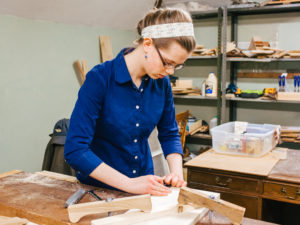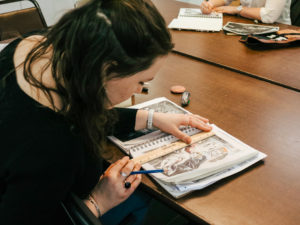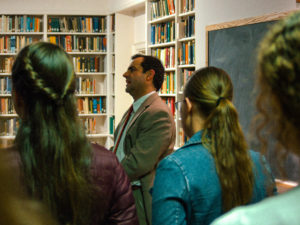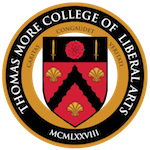The Thomas More College Guilds contribute to the development of the student, the life of the College, and the common good. Each guild instills a spirit of cooperation, prayer and service.
Catholic guilds flourished during the Middle Ages, but by the Nineteenth Century they had all but disappeared under pressure from Revolutionary Governments seeking to destroy all signs of tradition and fidelity to the Church. Guilds in their earliest form had developed out of man’s natural spirit of association. Guided explicitly by Church teachings, guilds encouraged a corporate enactment of charity and political prudence. Practically, they provided a forum for novices and masters to meet and practice their crafts.
Inspired by the original models, Thomas More College has established a series of guilds that enable students to gain practical skills and experience in areas such as woodworking, sacred art, and sacred music, and folk music. The College’s guilds take their spirit from those earlier voluntary communities of men and women who advanced their trades and arts while responding to the needs of their local communities.
Each guild meets for an hour each week and is taught by someone who is devoted to perfecting the skills of his or her trade.

More than Simple Recreation
For many students, the guilds are a welcome and relaxing break from their studies. This is to be expected, participation in them is meant to enjoyable. However, the guilds offer more than simple recreation. Each guild offers practical experience that is integrated with the College’s academic curriculum. Aristotle himself had stated that a purely liberal arts education, without some exposure to the useful arts was harmful to the student. Pope Benedict XVI pointed out that Our Lord, St. Paul, and the Benedictine tradition all reveal the distinctive nature of Catholic education: an education that does not divide what is contemplative from what is practical, what is beautiful from what is useful. The Catholic student must always remember that he is made imago Dei, in the image of God, and that God Himself is a Creator of things and so he too must learn to be a maker and steward of creation. The guilds are a forum in which the virtues are taught through hands-on experience. The lessons learned through the guilds can be applied to any aspect of daily life, even if one does not go on to pursue woodworking, art, music or homesteading as a career. After all, virtues such as patience, exactitude, practical self-mastery, apprenticeship, and creativity—whether it is learned in the fashioning of a dovetail joint or performance of songs at a festival— profit the whole person and his community.
The Catholic student must always remember that he is made imago Dei, in the image of God, and that God Himself is a Creator of things and so he too must learn to be a maker and steward of creation.
Establishing and Reviving Tradition
Through the experience provided by the guilds, students will understand what is meant by a living tradition. A living tradition transmits knowledge that was learned in the past to the next generation. Once the tradition is known, students use their own creativity to speak to the present generation. The core principles of an art come alive and can be passed down—this orderly and personal participation is at the heart of tradition. In the guilds, students learn from a master and in turn are then in a position to become teachers themselves. Our hope is that this dual process of learning and teaching will not stop once students leave the College. For example, each member of the Music Guild will be capable of joining or forming a choir, teaching others, even those with no experience, how to chant the Mass and the Liturgy of the Hours.
Serving the Common Good
The Thomas More College Guilds contribute to the development of the student, the life of the College, and the common good. Each guild instills a spirit of cooperation, prayer and service. Service to the community is as simple as singing to the elderly in nursing homes, taking on construction projects in one’s parish, and baking bread for the homeless. Through habitual consideration of the end to which the guild’s activities are directed, students will understand how work, paid or unpaid, can be directed towards the common good. The old Roman virtue of labor comes alive! Through their twin labors (intellectual and practical) students will find new modes to engage the wider culture and be agents of its transformation.
Thomas More College offers students guilds in the following areas:
Saint Joseph Woodworking Guild
 Students explore the properties of the major kinds of wood used in fine woodworking, the use and care of hand tools, the preparation of rough lumber for finish work, joinery, project conception and design, and finishing. The class culminates in the completion of a small project of the apprentice’s choice, such as a bookcase.
Students explore the properties of the major kinds of wood used in fine woodworking, the use and care of hand tools, the preparation of rough lumber for finish work, joinery, project conception and design, and finishing. The class culminates in the completion of a small project of the apprentice’s choice, such as a bookcase.
Saint Luke Sacred Art Guild
 Students receive training in art theory and technique. They are introduced to various methods of capturing light and shadow with graphite. Students who have completed the first year of art guild are eligible for independent study. Independent study may take the form of cast drawing, painting, etc.
Students receive training in art theory and technique. They are introduced to various methods of capturing light and shadow with graphite. Students who have completed the first year of art guild are eligible for independent study. Independent study may take the form of cast drawing, painting, etc.
Saint John Ogilvie Folk Music Guild
 Learn the folk art of reciting poetry and singing in common. Guild members learn traditional song, poetry, and lore, principally in the Scottish and English traditions. The mission of the guild is the restoration of Catholic folk culture within homes and communities. Guild members know songs and poems that celebrate either the old nobility of Christendom or the good things that unite individuals within civilization, e.g. family, camaraderie, and love of country. Such songs and poems are in themselves good and beautiful. They are also useful for engendering noble affections and ideals, which strengthen and elevate the natural bonds between friends and family.
Learn the folk art of reciting poetry and singing in common. Guild members learn traditional song, poetry, and lore, principally in the Scottish and English traditions. The mission of the guild is the restoration of Catholic folk culture within homes and communities. Guild members know songs and poems that celebrate either the old nobility of Christendom or the good things that unite individuals within civilization, e.g. family, camaraderie, and love of country. Such songs and poems are in themselves good and beautiful. They are also useful for engendering noble affections and ideals, which strengthen and elevate the natural bonds between friends and family.
Saint Philip Neri Sacred Music Guild
 Students develop a broad repertoire of Gregorian chant, Renaissance polyphony, and other works that belong to the Church’s living tradition of sacred music. Through ongoing instruction and coaching, students will be led beyond the “grammar” of singing sacred music to an ever-growing integration of prayer and musicality. In this pursuit of choral excellence at the service of the Liturgy, students bring a gift of joy not only to themselves but also to the entire College community. In addition to singing, the Sacred Music Guild also provides the opportunity for students to learn more about Church teachings on sacred music, the philosophical and anthropological principles on which these teachings are based, and how to implement them in parish liturgical life.
Students develop a broad repertoire of Gregorian chant, Renaissance polyphony, and other works that belong to the Church’s living tradition of sacred music. Through ongoing instruction and coaching, students will be led beyond the “grammar” of singing sacred music to an ever-growing integration of prayer and musicality. In this pursuit of choral excellence at the service of the Liturgy, students bring a gift of joy not only to themselves but also to the entire College community. In addition to singing, the Sacred Music Guild also provides the opportunity for students to learn more about Church teachings on sacred music, the philosophical and anthropological principles on which these teachings are based, and how to implement them in parish liturgical life.
Saint Hubertus Outdoorsman Guild
 “Lord, what would thou have me do?” So spoke the early medieval nobleman Hubert of Aquitaine, whose return to his faith took place amidst hunting and the exploration of the wilderness. The St. Hubertus Guild gives recognition and praise to the majesty of the created order, and sees in it opportunities for stewardship and spiritual growth through the union of practical arts and contemplation. Members of this guild are offered certified training with licensed conservation instructors. In the Autumn, guild members will have the opportunity to take a hunter education course (gun and bow), in which they will learn firearm safety, wildlife identification, tracking, and conservation stewardship. The course culminates in both a written and field examination; successful students receive New Hampshire State certification and may obtain a hunting license. In the Winter and Spring, parallel courses are offered in trapping, basic fishing and fly fishing. Throughout the year, the Guild will offer opportunities for small group wilderness outings, traditional woodcraft classes, hunting, and hiking. The guild takes its inspiration from the International Catholic Order of St. Hubertus, whose motto is Deum Diligite Animalia Diligentes— “Honor God by Honoring His Creatures.”
“Lord, what would thou have me do?” So spoke the early medieval nobleman Hubert of Aquitaine, whose return to his faith took place amidst hunting and the exploration of the wilderness. The St. Hubertus Guild gives recognition and praise to the majesty of the created order, and sees in it opportunities for stewardship and spiritual growth through the union of practical arts and contemplation. Members of this guild are offered certified training with licensed conservation instructors. In the Autumn, guild members will have the opportunity to take a hunter education course (gun and bow), in which they will learn firearm safety, wildlife identification, tracking, and conservation stewardship. The course culminates in both a written and field examination; successful students receive New Hampshire State certification and may obtain a hunting license. In the Winter and Spring, parallel courses are offered in trapping, basic fishing and fly fishing. Throughout the year, the Guild will offer opportunities for small group wilderness outings, traditional woodcraft classes, hunting, and hiking. The guild takes its inspiration from the International Catholic Order of St. Hubertus, whose motto is Deum Diligite Animalia Diligentes— “Honor God by Honoring His Creatures.”
Saints Isidore and Maria Homesteading Guild
 The first French and English settlers of North America could not, on a daily basis, focus on practicing only one skill. Each man had to be a “jackof-all-trades.” The settlers brought traditions, crafts, and skills with them from their European communities, and they learned new skills from the Native Americans communities they encountered, such as the Abenaki and Pennacook. Despite war, epidemic, and many other struggles, there were moments of great economic and spiritual cooperation between the native tribes and new settlers. Thomas More College lauds the cooperative relationship between the New and the Old world—communities such as those guided by the Jesuit Fr. Sebastien Rale or established by Thomas Morton. These moments resemble what animates the traditional medieval style guild—economic cooperation, personal contact, and both spiritual and natural fellowship. The Sts. Isidore and Maria Guild differs in that students do not master any one specific skill, but rather study under several different mentors to explore the world of skills necessary to survive and thrive in early America. This includes firebuilding, foraging, agriculture, baking, animal husbandry, bee-keeping, sugaring (traditional maplesyrup production), and other similar skills.
The first French and English settlers of North America could not, on a daily basis, focus on practicing only one skill. Each man had to be a “jackof-all-trades.” The settlers brought traditions, crafts, and skills with them from their European communities, and they learned new skills from the Native Americans communities they encountered, such as the Abenaki and Pennacook. Despite war, epidemic, and many other struggles, there were moments of great economic and spiritual cooperation between the native tribes and new settlers. Thomas More College lauds the cooperative relationship between the New and the Old world—communities such as those guided by the Jesuit Fr. Sebastien Rale or established by Thomas Morton. These moments resemble what animates the traditional medieval style guild—economic cooperation, personal contact, and both spiritual and natural fellowship. The Sts. Isidore and Maria Guild differs in that students do not master any one specific skill, but rather study under several different mentors to explore the world of skills necessary to survive and thrive in early America. This includes firebuilding, foraging, agriculture, baking, animal husbandry, bee-keeping, sugaring (traditional maplesyrup production), and other similar skills.
For further reading:
Painting, Poems, and Pageants: Guildmaster John Folley and the Sacred Art Guild
